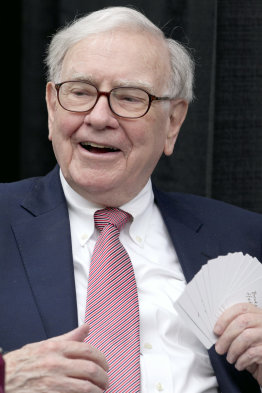A fortune requires finesse. As well as a willingness to embrace financial exotica, trips to Bermuda and the drive to start your own business--as a survey of FORBES' knowledge of the world's wealthiest people reveals. Below are seven tricks, secrets and maneuvers regularly conducted by those with more than a shekel or two to accumulate and maintain their fortunes.
1. Start Your Own Business
 Warren Buffett, chairman and CEO of Berkshire Hathaway (AP/Nati Harnik)Click over to FORBES' roll of billionaires, and you'll notice something if you dig into the biographies. Nearly all of the 1,426 billionaires made their fortunes through an entrepreneurial spirit (or their fortunes come from a family member who created the business). Ten-figure sums aren't earned by rising through corporate ranks. They're made from creating the whole shebang from scratch. It will likely occur by happenstance, in the most unsuspecting of ways.Recall that the world's fourth richest man, the aforementioned Buffett, left the working world in 1955 with plans to retire. Shortly after, cajoled by a seven-person group of family and friends, twentysomething Buffett formed a partnership that laid the groundwork for his $53.5 billion fortune. He did so over a small dinner at the Omaha Club.
Warren Buffett, chairman and CEO of Berkshire Hathaway (AP/Nati Harnik)Click over to FORBES' roll of billionaires, and you'll notice something if you dig into the biographies. Nearly all of the 1,426 billionaires made their fortunes through an entrepreneurial spirit (or their fortunes come from a family member who created the business). Ten-figure sums aren't earned by rising through corporate ranks. They're made from creating the whole shebang from scratch. It will likely occur by happenstance, in the most unsuspecting of ways.Recall that the world's fourth richest man, the aforementioned Buffett, left the working world in 1955 with plans to retire. Shortly after, cajoled by a seven-person group of family and friends, twentysomething Buffett formed a partnership that laid the groundwork for his $53.5 billion fortune. He did so over a small dinner at the Omaha Club.[More from Forbes: Billionaire Hedge Fund Managers]
2. Put Growth Investments In A Roth IRA
The investments with the greatest potential for growth should go into a Roth IRA. They sit there tax free, and as long as you wait until the age requirement (59 and a half), withdraws won't be levied either. Employees at fast-growing private companies often go this route. Peter Thiel did it as CEO of PayPal in 2001, buying 1.7 million shares for 30 cents a share through his Roth. The 2002 eBay acquisition of PayPal make those shares produce a $31.5 million profit. The man who founded PayPal with Thiel, Max Levchin, has also done something similar. His Roth has already sold 3.1 million Yelp shares and holds another 3.9 million. Result: some $95 million that an elder Levchin can withdraw tax free.
3. Find Stocks You'll Never Sell
3. Find Stocks You'll Never Sell
At the forefront of investing royalty in the last century was an intense man with round glasses from northern California named Philip Fisher. He became the first to author an investing book that cracked The New York Times bestseller list with Common Stocks and Uncommon Profits in 1958. It became an establishing text for modern growth investing, laying out a 15-point strategy that wound up catching the attention of a young man from Nebraska: Warren Buffett, who would make tens of billions of dollars through a combination of Fisher's tenets and those by value investing founding father Benjamin Graham.
Today, Fisher's son, Ken, is also a billionaire. He manages a $42 billion asset management company, and still calls northern California home. The younger Fisher is perhaps more value oriented than his father--especially favoring the price/sales ratio when assessing a company's worth--but there's a particular point in his father's work that he says is never far from his mind. Probably because it plays well in value investing, too. It's the idea that you buy a stock with the mentality to own it forever.
Papa Fisher had good reason to buy and never let go. He faced capital gains rates that topped 45%. (Today's, by contrast, cap gains are much lower at 20% or so.) He bought DuPont and Dow Chemical in the 1930s, selling them only four decades or so later. He picked up Motorola in the 1980s, and still owned shares when he died at age 96 in 2004.
Does such a mentality have a place in today's world of milisecond trading? "If done right, yes," says the younger Fisher. "People aren't perfect, though."
Does such a mentality have a place in today's world of milisecond trading? "If done right, yes," says the younger Fisher. "People aren't perfect, though."
4. Insurance, Bermuda-Style
The latest tax loophole exploited by hedge funds involves the reinsurance business. A whole host of billionaire hedge fund managers have started Bermuda-based reinsurance companies since 2011,according to Bloomberg, and the roll includes bold-faced names like John Paulson, SAC Capital Advisors' Stevie Cohen, Third Point's Dan Loeb. (They were inspired by Greenlight Capital's David Einhorn.) By sending money through these companies, the hedge funds recycle it and reduce personal income taxes and delay the eventual tax bill. Normally the managers would be paying either ordinary income taxes (39.6%) or long-term capital gains taxes (20%).
5. Make Your Corporation Pay You
5. Make Your Corporation Pay You
 Actress Hilary Duff (Kevin Winter/Getty Images)Ever heard of these corporations: Screaming Lord Baltic, Flip-Flop Films or On Nets Above People? Probably not, unless you're toiling in Warner Brothers' back-office.
Actress Hilary Duff (Kevin Winter/Getty Images)Ever heard of these corporations: Screaming Lord Baltic, Flip-Flop Films or On Nets Above People? Probably not, unless you're toiling in Warner Brothers' back-office.
Each of those entities were incorporated by an entertainer, specifically those advised by Scott Feinstein, who reps celebs like Aaron Paul, Hilary Duff and Taylor Lautner. Feinstein suggests the maneuver because it allows clients to better manage taxes and expenses. Celebs many times have trouble deducting some of large business expenses they face. "These are people paying out like 20% or 40% in their income in expenses," to people like agents and managers, Feinstein says. Why can't the silver-screen crowd make the deductions? The Alternative Minimum Tax, something every American pays. "It effects something like 20 million Americans, and it limits how many expenses you take to eliminate your taxable income."
To get around this, celebs start a corporation and instruct producers to pay the corporation, not them directly. (The government made an exception for entertainers to earn wages this way, Feinstein says. You, in all likelihood, can not.) The corporation, in turn, pays the entourage, and the star emerges with a lowered taxable income.
[More from Forbes: 7 Secrets Wealthy People Know]
[More from Forbes: 7 Secrets Wealthy People Know]
While Feinstein favors this method, he refuses to take the blame for the oddity of the corporate names: "I tell them to come up with something that means something to them." Screaming Lord Baltic. Huh.
6. Think Like Zuck. Think Trusts
6. Think Like Zuck. Think Trusts
Doubts about Facebook the company's longevity aside, Mark Zuckerberg and his co-founder Dustin Moskovitz have already taken steps to secure their family's legacy. As FORBES reported last March, Zuckerberg and Moskovitz put pre-IPO stock into a type of financial instrument called a grantor retained annuity trust (GRAT). The pair, by FORBES estimates, wound up moving more than $200 million to the trusts. Future payouts will avoid the 45% gift tax that existed (in 2008) when these trusts were created. Perhaps not as cool as sliding $1 billion past the IRS, but a GRAT is especially useful for stashing away hard-to-value assets, like private companies shares, because it allows changes to the trust's details if you're audited.
7. Cash Flow Is Important. Buy MLPs, Sell The Steak House
7. Cash Flow Is Important. Buy MLPs, Sell The Steak House
Where does Brad Pitt put his multi-million-dollar paychecks? It's not too much to presume that he, like much of Hollywood, has money invested in master limited partnerships (MLPs). Conversations with five of Hollywood's top money managers revealed a cult following for these stocks, which generate strong yields and cash flow. Like real estate investment trusts, MLPs pay no taxes. Hence, they have more to share with investors, and payouts are more lightly taxed.
[More from Forbes: The World's 20 Richest People]
[More from Forbes: The World's 20 Richest People]
They're certainly more than one-hit wonders. The Alerian MLP Index's returns beat the S&P 500's on a 1-year, 3-year-, 5-year and 10-year basis. The index, holding some 50 MLPs, favors gas-and-oil infrastructure companies like Enterprise Products Partners, Kinder Morgan and Plains All American Pipeline.
Alan Goldman, a Los Angeles business manager with a star-studded rolodex and client roster, says he's often left talking his crew out of pitches on the next trendy restaurant, instead advising more consistent investments, like MLPs. "We find that they need to be more conservative than Joe Average." Goldman sighs. "The restaurants are very, very popular with entertainers. We look at something like a restaurant and just assume that the money is gone."
Source: yahoo.com






